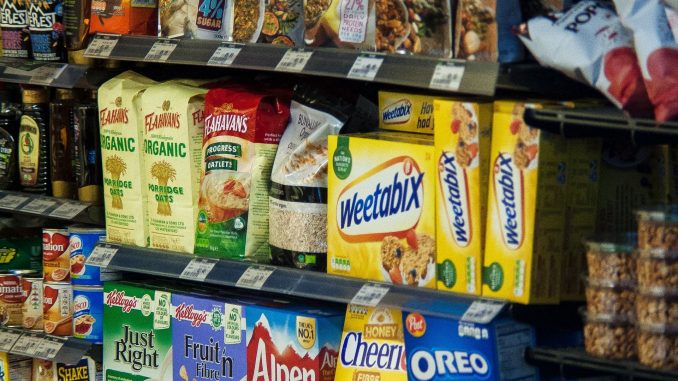
Navigating a supermarket during peak hours is most people’s nightmare, worse if you’ve forgotten your shopping list, and doubly worse if you’re filling your cart with things you don’t want, need, or like because of an arbitrary color coding system. A recent study from NielsenIQ found that in France, the home of Nutri-Score, 26% of the country’s food products were labeled with the Front of Package (FOP) food label—a label that is stirring hot debate in Brussels as the bloc aims for food label harmonization. The labeling system’s algorithm is supposed to rank food from healthiest to unhealthiest giving products a letter grade (A-E) with an associate stop light color (green to red).
The controversial label is receiving well-deserved scrutiny as it has yet to accurately do what it has set out to do. In its very short existence, it has already gone through multiple iterations with ever-changing stances regarding what foods are good and what foods are bad. The label lacks a solid scientific foundation, simply instead responding to external pressures and criticism. Not surprisingly, it has faced strong pushback not just from European member states and local farmers who refuse that their traditional products – often with European heritage labels like AOP or DOC – like Roquefort cheese, Spanish olive oil, and even plums, to be falsely labeled as “bad foods”—being given poor ratings simplistically based on their salt, fat, and sugar content. There is no regard for the bigger picture and taking neither processing nor broader nutritional benefits into account. Perhaps one cannot expect more from an algorithm created by Serge Hercberg, someone who identifies as an epidemiologist first and a nutritionist second.
It’s not just member states and farmers who are sounding the alarm regarding Nutri-Score, either—the algorithm is also receiving mounting criticism from scientists and peers in the field of nutrition. Leading nutritionist Professor Philippe Legrand, for example, has criticized Nutri-Score and categorized its treatment of fats as “outdated”.
Countries coming to their senses
Slowly, but surely countries are waking up and coming to a fundamental realization: there is no one size fits all solution for their constituents, least of all when it comes to something as personal as food. Food choices are based on a variety of different factors: culture, religion, cost, availability and access, education, marketing, and appetite. It seems beyond unreasonable to expect that Europe, with its profound diversity (including when it comes to food), would be able to categorize what is good and what is bad. Romania has understood this and acted accordingly—effective May 1st, the country banned Nutri-score as a measure of consumer protection, explaining that the FOP label could not accurately inform consumers.
Switzerland is also on the path of common sense; after having adopted Nutri-Score it might become the first country in Europe to back-pedal and overturn the adoption. The Swiss Council of States has approved a motion brought forward by the Commission of Science, Education and Culture asking the representatives to consider the potential negative outcomes of the Nutri-Score adoption. The motion evokes the fact that a healthy diet requires a broad and varied approach to eating and cannot rely on scores assigned to single food packages.
This is especially true when one considers that in France, 54% of frozen foods have a Nutri-Score label whereas only 27% of dairy products have a Nutri-Score label. Should a consumer rely on Nutri-Score to determine what should fill their shopping cart they would potentially have a disproportionate amount of frozen goods to dairy products, not because the items are particularly healthy, but simply because there is a little label with a color and a letter.
Exclusionary for small businesses
Rather than being a tool that helps people make healthy tools, Nutri-Score has turned into a marketing tool utilized by companies to push their products to consumers, and not because of their health benefits. Nestlé, for example, is a company that has adopted Nutri-Score across the board. The company faced serious ire from English consumer watchdogs who pointed to their Kit-Kat cereal receiving a Nutri-Score C despite having almost half of a child’s daily recommended sugar intake in a single 30g serving.
For smaller companies, while the ability to apply for Nutri-score is a straightforward process, receiving a good score is not. Larger companies are able to exploit their incredibly powerful R&D centers to optimize their product with a theoretically perfect nutrition composition to receive the best possible grade while a smaller company selling the same product with more honest ingredients will be penalized. Being at a perpetual disadvantage vis-a-vis larger companies with more resources means that the food market will become even more exclusionary for small businesses, thus contributing to a lack of diversity in food choices which at the end of the day negatively impacts the consumer.
Ultimately Nutri-Score, while perhaps well-intentioned, does nothing to help consumers make healthier choices as there is a fundamental miscalculation at its core. It is based on a core fallacy which is that we all eat the same and that we all require the same foods to live a healthy life. The richness of Europe is its diversity— it is reflected in our people and in our food. To aim to homogenize something so deeply personal is to take away our culture and our individuality.
Instead, the European Union should aim to help countries foster food diversity, encouraging small businesses to contribute to varied food markets and have their place at the table. Variety contributes to a diversified economy with small and large businesses catering to consumers’ needs. Meeting demand while honoring the taste preferences and needs of all consumers is the best possible grade a company can receive—one doesn’t need a label for that.


Leave a Reply